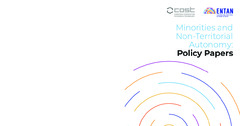Приказ основних података о документу
Can National Councils of National Minorities Be Effective Channels for Greater Political Participation of Women from National Minority Communities in Serbia?
| dc.creator | Ćeriman, Jelena | |
| dc.date.accessioned | 2024-01-17T09:40:35Z | |
| dc.date.available | 2024-01-17T09:40:35Z | |
| dc.date.issued | 2023 | |
| dc.identifier.isbn | 978-608-4607-61-8 | |
| dc.identifier.uri | http://rifdt.instifdt.bg.ac.rs/123456789/3732 | |
| dc.description.abstract | Weak public institutions, a deficit of democratic political traditions and the undermining of minority issues (due to a well-developed but poorly implemented legal framework) are all obstacles to the functioning of NMCs and their effectiveness as channels for greater political participation of women from national minority communities in Serbia. When it comes to the effective participation of women in NMCs, most male leaders are not ready to hand power over to women, and both men and women do not sufficiently realise the gender dimension beyond the numerical representation of women within NMCs. Increasing the motivation of (young) women to get involved in politics might affect the overall quality of NMC work, but a change also needs to be made to the political climate, which is still masculine in nature. The solidarity of (young) women from national minority groups should be strengthened, regardless of political party affiliation, and they should be encouraged to be louder and braver in expressing their views in public debates, so that they can fight for their interests. The mainstreaming of minority issues thus faces both external and internal political obstacles. The most important external barriers are impassable or selective channels of communication between the government and national minority representatives, party influence and inert coordination between institutions at different levels of government to iterate the needs of national minorities and mainstream minority issues. Internal barriers are primarily based on NMC members’ and leaders’ poor knowledge of gender issues, and the absence of a clear policy on gender equality supported by an imprecise legal framework related to NMCs’ actions in this area. Even when there are activities aimed at women within NMCs, or affirmative measures in the wider national community, they tend to be ad hoc rather than a planned approach aimed at gender equality. Therefore, it is necessary to strengthen the monitoring of NMCs’ activities according to gender-sensitive indicators, and to regularly evaluate the effectiveness of NMCs’ work in all four mandated areas. The planning of effective gender-inclusive budgeting is also important for the implementation of all activities, which includes the necessity of awareness and competences for that area, as well as public powers over the allocation of public funding. One of the best practices in this regard can be seen in Hungary, where minority self-governments are able to manage their own budgets through a government decree that specifies regulations for the planning and appropriation of funds (Dobos, 2021). | sr |
| dc.language.iso | en | sr |
| dc.publisher | University American College Skopje (UACS) | sr |
| dc.relation | This publication is based upon work from COST Action “ENTAN – The European Non-Territorial Autonomy Network”, CA18114 supported by COST (European Cooperation in Science and Technology) | sr |
| dc.rights | openAccess | sr |
| dc.rights.uri | https://creativecommons.org/licenses/by/4.0/ | |
| dc.source | Minorities and Non-Territorial Autonomy: Policy Papers | sr |
| dc.subject | minorities | sr |
| dc.subject | women | sr |
| dc.subject | political participation | sr |
| dc.subject | non-territorial autonomy | sr |
| dc.subject | national councils of national minorities | sr |
| dc.title | Can National Councils of National Minorities Be Effective Channels for Greater Political Participation of Women from National Minority Communities in Serbia? | sr |
| dc.type | publicPolicy | sr |
| dc.rights.license | BY | sr |
| dc.type.version | publishedVersion | sr |
| dc.identifier.fulltext | http://rifdt.instifdt.bg.ac.rs/bitstream/id/13481/Minorities-and-Non-Territorial-Autonomy-Policy-Papers_final-web.pdf | |
| dc.identifier.rcub | https://hdl.handle.net/21.15107/rcub_rifdt_3732 |

